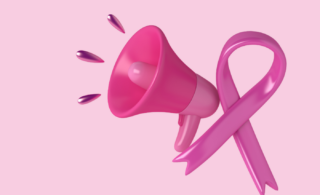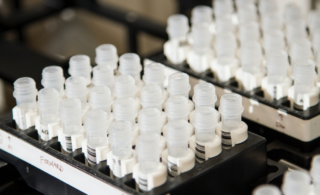
Peer support during cancer treatment can be invaluable. This article shares some top tips for going through treatment with the hope that they might help you navigate your way through breast cancer.
By Kimberly
It started with the death of Kelly Preston
The beautiful, talented actress. Yes, John Travolta’s wife. I woke up on a July morning during the throes of the pandemic in 2020, grabbed my phone off my nightstand, and there it was. Kelly had passed from breast cancer.
I didn’t even know she had been sick. The bottom fell out of my stomach, and I knew.
I knew I had cancer.
I was scheduled for a routine scan in just a couple of days. My strong family history of breast cancer has made this possible for years; I have been closely followed. I knew this time I wasn’t going to receive good news.
I was right. Stage 1 invasive ductal carcinoma, triple positive.
Treatment was one of the hardest things I have ever had to do, and while I was going through it, I carried a notebook and wrote down tips to pass along to other women on their own cancer journey. I hope that they can help you or a loved one.
My top ten tips to help you or a loved one navigate breast cancer
- First and foremost when the “C word” is first used with and around your name, you will feel like you are having an out-of-body experience. This is normal. It will get easier with time. Which leads me to…
- Bring someone with you to your oncology consultation. Your doctor is going to pour out a lot of information at this visit, and you are likely going to only hear about ¼ of it because you cannot believe any of this is happening. Have your support person take notes for you.
- Write down every prescription, OTC and vitamin you take, complete with strength and dosing. Put this in your bag and take it with you to every appointment. Update it accordingly. The nurses will constantly ask you for this information. You’ll be surprised how often you will refer to this.
- Ask your doctor if your chemo will cause joint and muscle pain. If so, discuss a way to get in front of it. You will thank me later!
- Before I began chemo (Taxol, 12 weeks), I bought 12 inexpensive pick-me-up gifts and put them in a pretty bag. Think: a pretty nail polish, a Kit Kat bar, a fun pen. Every Monday afternoon when I got home from the hospital, I reached into the bag and pulled out one item as a reward. It was a fun way to treat myself.
- Get a blank journal and write down how you are feeling every day during treatment. Be sure to note any changes and side effects you’re having. Bring this information to your doctor appointments. Your oncologist will appreciate this.
- I wore inspiring t-shirts to chemo treatments so that I would not associate any of my regular clothing with cancer. One of my best decisions. My fave? A shirt that said, “Killing it”.
- Chemo will make it difficult for you to clot if you cut yourself. Keep Band-Aids on supply and carry some in your bag for nicks or paper cuts.
- Dark eyeliner on your upper eyelid can help hide the lack of eye lashes, should you lose them. Google “tightlining” or check You Tube for how-to videos.
- Recovery is not a straight line. Read that again.
To return to the homepage of our Information Hub, click here where you can access more helpful information, practical advice, personal stories and more.
Future Dreams hold a range of support groups, classes, workshops and events to help you and your carers during your breast cancer diagnosis. These are held both online and in person at the London-based Future Dreams House. To see what’s on offer and to book your place, see here.
March 2022
This article was written by a guest author based on their own experience of breast cancer and its treatment. It is important to note that this is one person’s experience and that whilst there may be commonalities between the experiences of different people, everyone has a different diagnosis/treatment plan/general experience. The information and content provided in all guest articles is intended for information and educational purposes only and is not intended to substitute for professional medical advice. It is important that all personalised care decisions should be made by your medical team. Please contact your medical team for advice on anything covered in this article and/or in relation to your personal situation. Please note that unless otherwise stated, Future Dreams has no affiliation to the guest author of this article and he/she/they have not been paid to write this article. There may be alternative options/products/information available which we encourage you to research when making decisions about treatment and support.
Share

Support awareness research
Donate to those touched by BREAST cancer
Sylvie and Danielle began Future Dreams with just £100 in 2008. They believed nobody should face breast cancer alone. Their legacy lives on in Future Dreams House. We couldn’t continue to fund support services for those touched by breast cancer, raise awareness of breast cancer and promote early diagnosis and advance research into secondary breast cancer without your help. Please consider partnering with us or making a donation.



